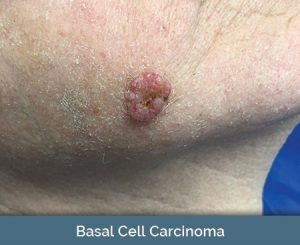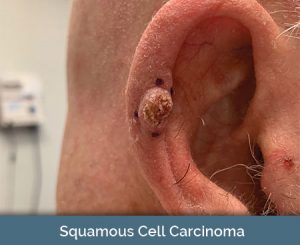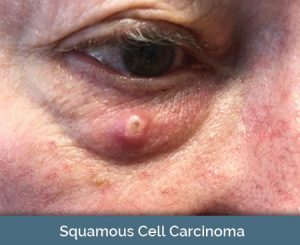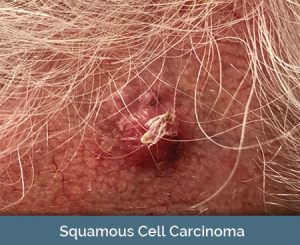Conditions
What is Carcinoma?
Carcinoma is a type of cancer beginning in skin cells or the cells of tissue lined organs, such as the kidneys or liver. Similar to melanoma or other types of cancer, carcinomas are caused by abnormal cells dividing and mutating uncontrollably. They most commonly occur as basal cell or squamous cell carcinomas, which are highly curable if detected early and treated properly.
Basal and squamous cell carcinomas usually develop on skin that has had too much exposure to the sun. By practicing sun safety, it is possible to reduce your chances of developing skin cancer. Additionally, it is important to monitor any new developments or changes in your skin to ensure the earliest detection possible of any cancerous or pre-cancerous lesions. An annual skin cancer check at Dermatology Associates of Plymouth Meeting is the best way to determine if any spots on your skin are at risk of becoming cancerous.
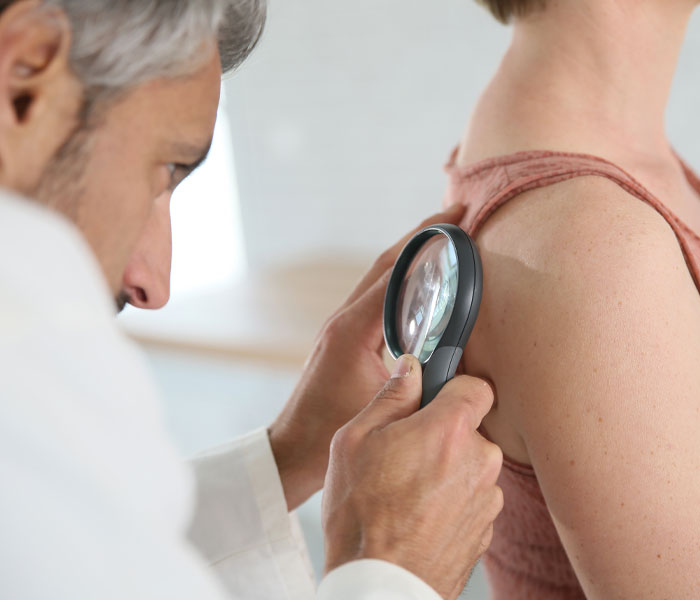
How to Identify Carcinoma
Skin cancer can often be mistaken for relatively common skin issues like eczema or psoriasis, so it is worthwhile to learn the symptoms and warning signs of skin cancer such as basal cell carcinoma or squamous cell carcinoma. Even though these types of carcinomas are rarely life-threatening, they should still be removed as early as possible to prevent potential complications.
Identifying Basal Cell Carcinoma
Basal cell carcinoma commonly looks like a slightly transparent bump on the skin, although it can take other forms such as open sores, red patches, shiny bumps, pink growths or scars. Rarely will basal cell carcinoma spread beyond its original site to become life-threatening, however it can lead to scarring or disfigurement if left untreated.
Identifying Squamous Cell Carcinoma
Squamous cell carcinoma is more serious, though usually not life-threatening. Compared to basal cell carcinoma, squamous cell carcinoma is more likely to grow deeper into the layers of the skin than basal cell carcinoma, and it is capable of spreading to other parts of the body. The most common symptoms of squamous cell carcinoma include scaly, irritated skin or elevated growths that appear similar to warts.
Diagnosis and Treatment of Carcinoma
Excisional surgery and Mohs micrographic surgery are most commonly used to remove basal and squamous cell carcinomas. These treatments work by removing the cancerous growth along with a margin of healthy skin that is surrounding the growth. In excisional surgery, a scalpel is used to cut around the growth, whereas in Mohs micrographic surgery, the skin is removed layer by layer and examined during surgery until only cancer-free tissue remains.
Physicians at Dermatology Associates of Plymouth Meeting are board-certified dermatologists who are subspecialists in dermatologic surgery and experts in carcinoma treatment. Our fellowship-trained Mohs surgeon has performed more than 25,000 Mohs cases, making our practice one of the best choices for receiving this advanced method of skin cancer removal that offers the highest cure rate available.
Other treatments that may be considered for basal cell or squamous cell carcinoma are radiation therapy, immune response modifiers, photodynamic therapy, topical chemotherapy or cryotherapy. For squamous cell carcinomas that have spread internally, lymph node dissection or systemic chemotherapy and/or targeted therapy drugs may be needed.
Basal and Squamous Cell Carcinoma Staging
If you suspect you may have basal or squamous cell carcinoma, make an appointment immediately at Dermatology Associates of Plymouth Meeting for an examination. If you do possess a type of carcinoma, our dermatologists will be able to determine what type and what stage it is. The stage of your skin cancer is based on the size of the tumor, how deeply it has grown into the skin and whether it has spread to the lymph nodes. Your treatment plan will be customized based on the type and stage of cancer, your overall health and other factors.
Schedule your appointment at Dermatology Associates of Plymouth Meeting for a professional skin check where any suspicious lesions can be identified. Many skin cancers can be treated at your appointment in the comfort of our office. We are eager to help you achieve optimal health by reducing your risks of developing carcinoma or other types of skin cancer through prevention, diagnosis and treatment.

